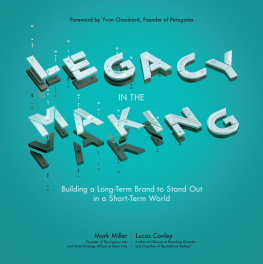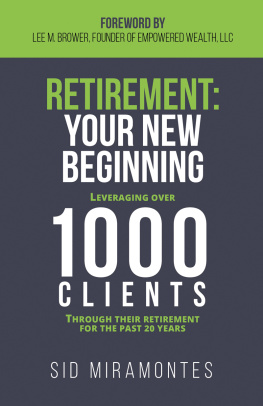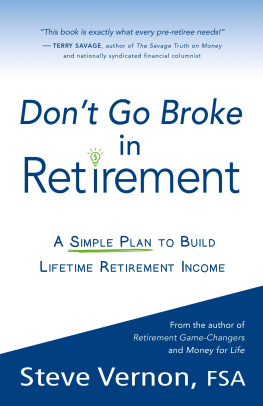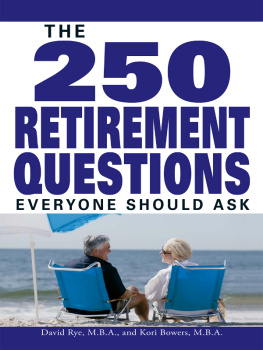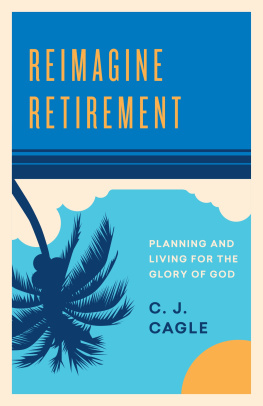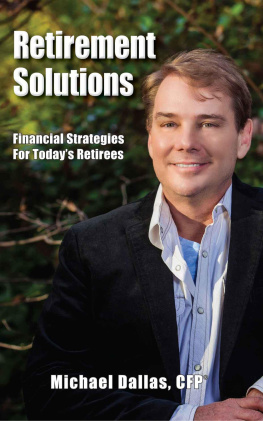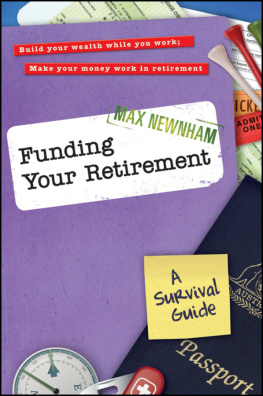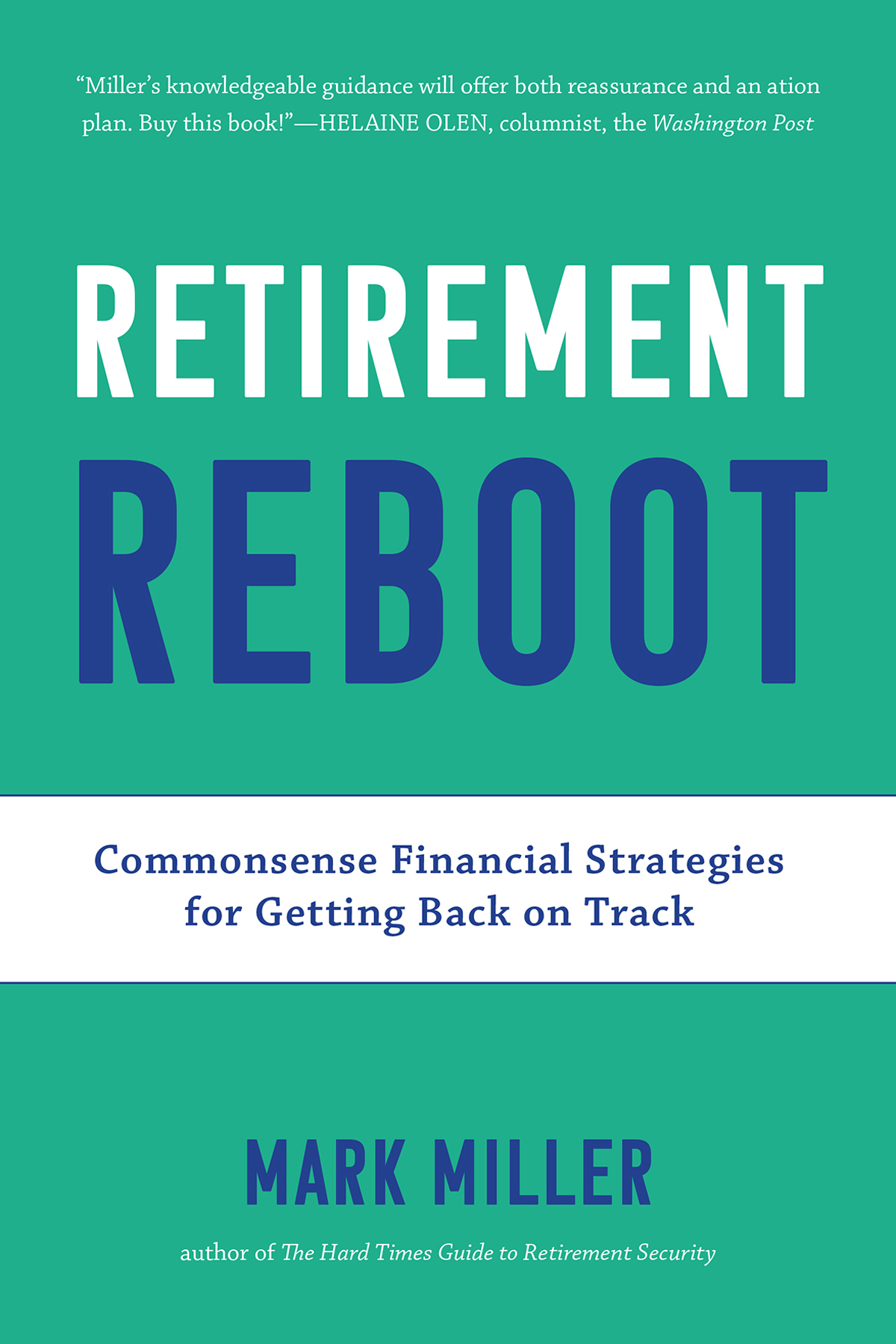Table of Contents
Guide
Pagebreaks of the Print Version
RETIREMENT
REBOOT
Commonsense Financial Strategies for Getting Back on Track
MARK MILLER
A B2 BOOK
AGATE
CHICAGO
Copyright 2023 by Mark Miller
All rights reserved. No part of this book may be reproduced or transmitted in any form or by any means, electronic or mechanical, including photocopying, recording, or by any information storage and retrieval system, without express written permission from the publisher.
This book presents well-researched suggestions to improve personal retirement planning only for general and informational purposes. It does not provide legal or accounting advice. Should you require professional advice, consult a financial or tax expert. Neither the author nor publisher assumes liability for loss or damages resulting from the use of information in this book.
First printed in January 2023
Printed in the United States of America
10 9 8 7 6 5 4 3 2 1 23 24 25 26 27
Library of Congress Cataloging-in-Publication Data
Names: Miller, Mark (Writer on retirement), author.
Title: Retirement reboot : commonsense financial strategies for getting back on track / by Mark Miller.
Description: Chicago : B2 Book, Agate Publishing, [2023] | Includes bibliographical references and index.
Identifiers: LCCN 2022019148 (print) | LCCN 2022019149 (ebook) | ISBN 9781572843196 (trade paperback) | ISBN 9781572848702 (ebook)
Subjects: LCSH: Retirement--United States--Planning.
Classification: LCC HQ1063.2.U6 M55 2023 (print) | LCC HQ1063.2.U6 (ebook) | DDC 332.024/014--dc23/eng/20220425
LC record available at https://lccn.loc.gov/2022019148
LC ebook record available at https://lccn.loc.gov/2022019149
B2 is an imprint of Agate Publishing. Agate books are available in bulk at discount prices.
For more information, visit agatepublishing.com.
To our children, Shira, Beth, Asher, David, and Sam:
May you enjoy long, satisfying careers filled with meaning and good workand retire with financial security, health, and a sense of purpose and engagement with family, friends, and the world.
Its one of the great secret scandals of our country that people dont realize they can work a lifetime and still not have enough money for retirement.
The late Karen Ferguson, executive director, Pension Rights Center, 2002
Table of Contents
By Chris Farrell, Senior Economics Contributor, Marketplace and Minnesota Public Radio
If you dont have a financial plan for retirement, its impossible to know where you stand.
Timing is everythingand retirement is no exception.
Social Security will be your most important source of retirement income, so its important to understand how this benefit works, and how to get the most from it.
Health care is one of the most significant expenses in retirement, and making smart choices about your Medicare enrollment can help you manage these costs.
If youre getting close to retirement and havent saved much, it is still possible to build significant savings late in the game.
If your retirement plan is coming up short, consider tapping what might be your most important asset: your home.
How to stay gainfully employed as long as you want toor need tobefore transitioning into retirement.
Most Americans hope to age right where they are. But its important to evaluate your living situation for age-friendlinesswhether that is your current home and community or somewhere else.
Contemplating a time when you might not be able to take care of your own daily living needs is difficultbut necessary.
Financial planning help once was the province of the wealthy, but over the past couple decades, it has become more accessible to average folksand it has become far more professional and holistic in approach.
Your tax burden will likely be lighter in retirement, but you may be able to smooth out or minimize the burden.
Traditional pensions are waning in the private sector, but if youre lucky enough to have one coming, its important to manage it well and make smart decisions.
The word may sound intimidating, but entrepreneurship later in your career can be a great way to keep working.
Whether you work as a volunteer or part-time for pay, using some of your time in retirement this way pays big dividends for your own health and mental well-being.
There is good reason to worry about the American retirement system as it is today, but we can improve it by strengthening and expanding our two most critical social insurance programs for retirement: Social Security and Medicare.
Foreword
Ive been a fan of Mark Millers columns on the personal finances of aging and retirement in the New York Times, Reuters, Morningstar, and other publications for a long time. Hes a deft writer and thoughtful storyteller with a knack for getting to the nub of the issue. Hes delved deep into his journalistic experience to address the vital and timely topic of how the financially unprepared can improve their economic security and quality of life in retirement. The financially fragile, by the way, is most of us. Popular images of the retirement years typically draw playful images of time on the beach, traveling to far-flung places, and checking off bucket-list adventures. The reality, as both private sector surveys and government data support, is that a majority of near-retirees arent financially ready for the next stage of life.
That realization is sobering, but it isnt a message of despair. The financially unprepared have time to boost the odds of creating greater economic security later in life. In Retirement Reboot: Commonsense Financial Strategies for Getting Back on Track, Mark takes a roll-up-the-sleeves approach and offers financially fragile near-retirees practical options and plans. He cuts through the many layers of complexity about retirement planning to get to the heart of sensible trade-offs and reasonable choices. With good reason, keep it simple is a valuable catchphrase in household money management.
Retirement is a major life transition. Here are just a few decisions near-retirees confront: when to retire; whether to embrace part-time work, an encore career, or leisure; whether to age at home or move elsewhere; how much to withdraw annually from retirement savings (assuming you have some); and, most importantly, when to claim Social Security benefits and what kind of Medicare plan to join. Thats far from an exhaustive list!
The good news is that some combination of the tactics Mark explains will help with these decisions. The hallmark of Retirement Rebootits defining featureis the emphasis he puts on understanding Social Security and Medicare. Too often these two bedrock programs are treated as a personal finance afterthought. Big mistake. The truly critical retirement decisions for most workers are deciding when to file for Social Security benefits and which Medicare plan to enroll in. Everything else pales in comparison (except for the sliver of extremely wealthy). Look at it this way: about half the U.S. population aged 65 or older are in households that receive at least half their income from Social Security, while 25 percent rely on Social Security for 90 percent of their income.
Heres what makes the timing of filing for Social Security income so important. The benefit is potentially 76 percent higher if you wait to file at age 70 (the latest claiming age) compared to age 62 (the earliest). Every year you delay past your full retirement age, youll get an approximately 8 percent boost. (The full retirement age for most people is currently 66 years plus several months.) Married couples in particular have a number of filing strategies to consider for maximizing their earned benefit. What matters is that you make an informed choice.


